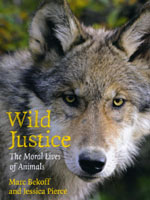Regrets in the wild
 In his column for today’s New York Times, John Tierney reports on a recent study that provided what researcher Ben Hayden touted as “the first evidence that monkeys, like people, have ‘would-have, could-have, should-have’ thoughts. ”
In his column for today’s New York Times, John Tierney reports on a recent study that provided what researcher Ben Hayden touted as “the first evidence that monkeys, like people, have ‘would-have, could-have, should-have’ thoughts. ”
Hayden and two other researchers scanned the brains of monkeys who were “trying to win a large prize of juice by guessing where it was hidden. When the monkeys picked wrongly and were shown the location of the prize, the neurons in their brain clearly registered what might have been.”
Weighing in on these findings, Mark Bekoff, author of the new Wild Justice: The Moral Lives of Animals, told Tierney that “these animals are not as emotionally sophisticated as humans, but they have to know what’s right and wrong because it’s the only way their social groups can work. Regret is essential, especially in the wild. Humans are very forgiving to their pets, but if a coyote in the wild gets a reputation as a cheater, he’s ignored or ostracized, and he ends up leaving the group. ”
In fact, as Bekoff and coauthor Jessica Pierce reveal in Wild Justice, animals exhibit a broad repertoire of such behaviors, including fairness, empathy, trust, and reciprocity. Underlying these behaviors, the authors argue, is a complex and nuanced range of emotions, backed by a high degree of intelligence and surprising behavioral flexibility.
In this excerpt, they put it even more succinctly, arguing “in short, that animals have morality.”